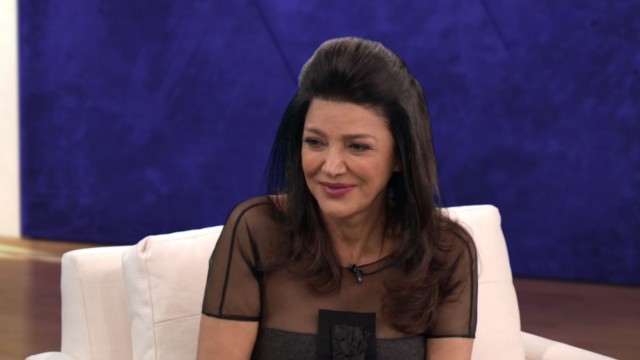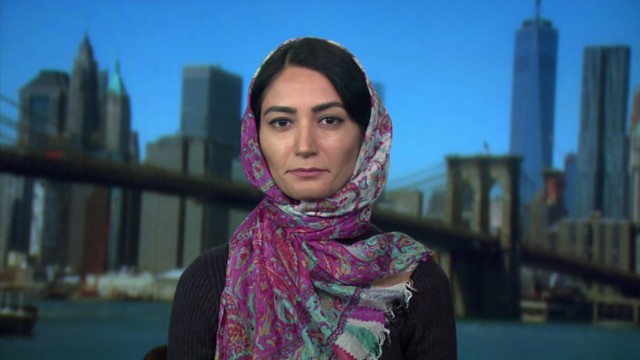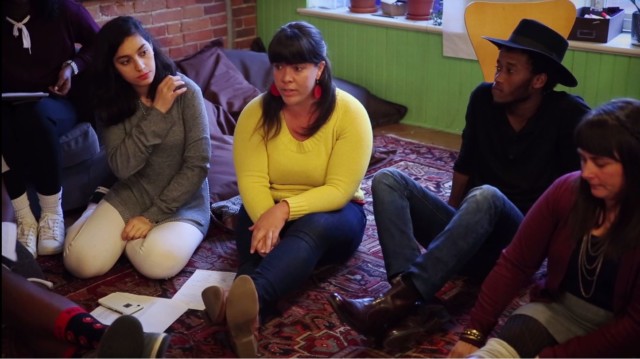Creating greater access to education around the world comes with many barriers.
But some people are taking matters into their own hands. They’re using social entrepreneurship, opening up access to technology and providing connections with peers and female role models.
This week on Full Frame, conversations with people who are committed to providing an education for everyone—despite age, gender, and background—throughout all corners of the world.
Shohreh Aghdashloo: Empowering girls through education

Award-winning Iranian-American actress Shohreh Aghdashloo talks about her career and about the non-profit organization Mother Miracle.
Born in Tehran, Shohreh Aghdashloo began her career acting in Iranian films in the 1970s. After leaving Iran, Aghdashloo moved to the U.K., where she began a promising career as a journalist. Eventually, she immigrated to the U.S., moving to Los Angeles, and returning to her first love, acting. She’s been nominated for an Academy Award and has won an Emmy, as well as several other awards. She’s starred in more than 25 films and currently plays the lead role in the American cable and satellite TV series, The Expanse on Syfy Network.
Recently, Aghdashloo starred alongside Morgan Freeman and Clive Owen in the film Last Nights, and has a supporting role in this year’s upcoming motion picture, The Promise, starrign Christian Bale and Oscar Isaac.
Off-screen, Aghdashloo supports Mother Miracle, a non-profit organization in India that works to improve the quality of life for children and families by providing them a chance for quality education.
Shohreh Aghdashloo joins May Lee in our Los Angeles studio to share her story about her career and to tell us more about Mother Miracle.
Fereshteh Forough: Breaking gender barriers

Fereshteh Forough discusses her mission to break gender barriers.
In 2015, Fereshteh Forough founded Code to Inspire, a nonprofit organization committed to educating female students in Afghanistan by teaching them how to code. Forough says she’s on a mission to empower young women in Afghanistan by improving their technical literacy. To achieve this, Code to Inspire provides a safe and secure place where women can learn, increase their confidence and self-esteem and gain marketable skills.
Forough also co-founded and served on the board of the Women’s Annex Foundation, an organization established to financially empower women and children in Central Asia. She hopes Code to Inspire will serve as a launching pad for Afghan women to explore and excel in both entrepreneurship and technological innovations.
From New York City, Fereshteh Forough joins May Lee in our Los Angles studio to discuss her mission to break gender barriers.
Technology as a tool: Transforming the way we learn

Scott Himelstein and Steve Vosloo join May Lee to share their vision for using technology as a tool to transform learning.
According to the United Nations, as of 2013, six billion of the world’s seven billion people have access to cell phones. That’s more than the number of people who have access to toilets around the world.
Mobile phones have not only revolutionized the way we communicate but also, in many classrooms around the globe, mobile technologies are increasing the power of learning.
Scott Himelstein and Steve Vosloo know, first-hand, how these technologies are impacting education and improving learning opportunities.
Scott Himelstein is the director of the University of San Diego’s Center for Education Policy and Law and Mobile Technology Learning Center.
Steve Vosloo is an expert in mobile learning with a specialization in Information and Communication Technologies in developing countries. In 2009 he launched the “M4Lit” or “Mobiles for Literacy” project, which evolved into what’s now called the Yoza Project. It demonstrates the potential of mobile publishing for supporting teen reading and writing in South Africa and Kenya. Vosloo currently serves as Head of Mobile at Pearson South Africa, where he’s responsible for setting the company’s mobile learning strategy and delivering key projects.
Scott Himelstein joins May Lee in our Los Angeles studio and Steve Vosloo joins them from Cape Town, South Africa. Himelstein and Vosloo share their vision for using technology as a tool for transforming the way we learn.
Telling Room: Helping immigrant teens tell their stories

International students attend The Telling Room’s unique after-school program.
The state of Maine, historically, is known as a majority white state. But the state’s largest city, Portland, is home to resettlement communities for families across the globe. As the city’s demographics shift, one tiny non-profit arts group is reaching out to help immigrant and refugee teens assimilate into their new communities and help their neighbors gain a better understanding of the journeys that have brought them to Maine.
The Telling Room runs an after-school program that gives these new students a place to practice English and share their personal stories through writing.
In this week’s Close Up, Full Frame takes a look at this unique educational program and the impact it is having on the lives of its participants.
 CGTN America
CGTN America